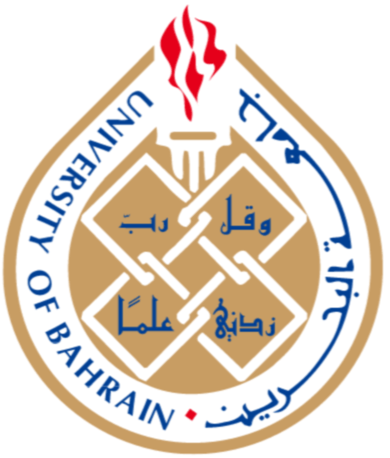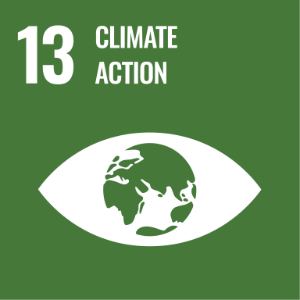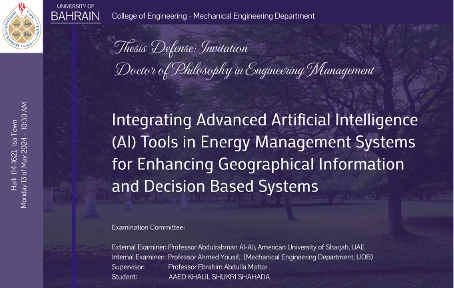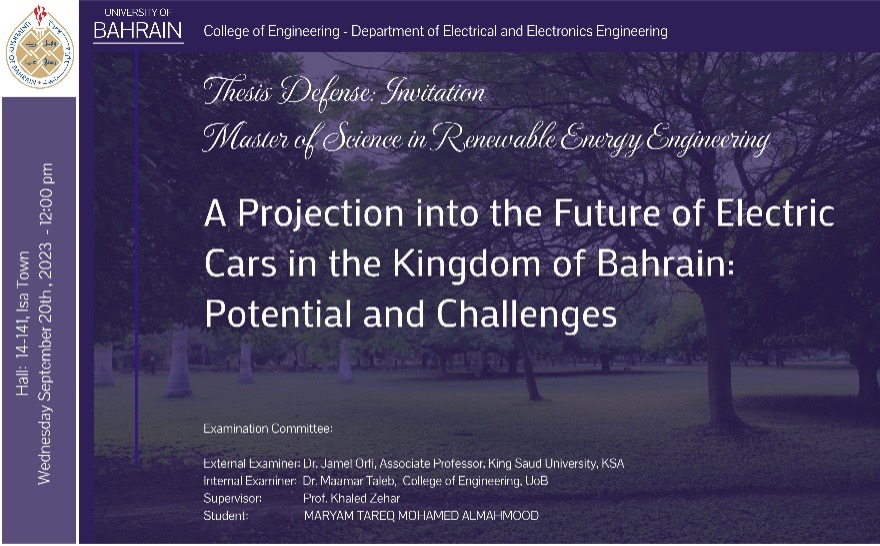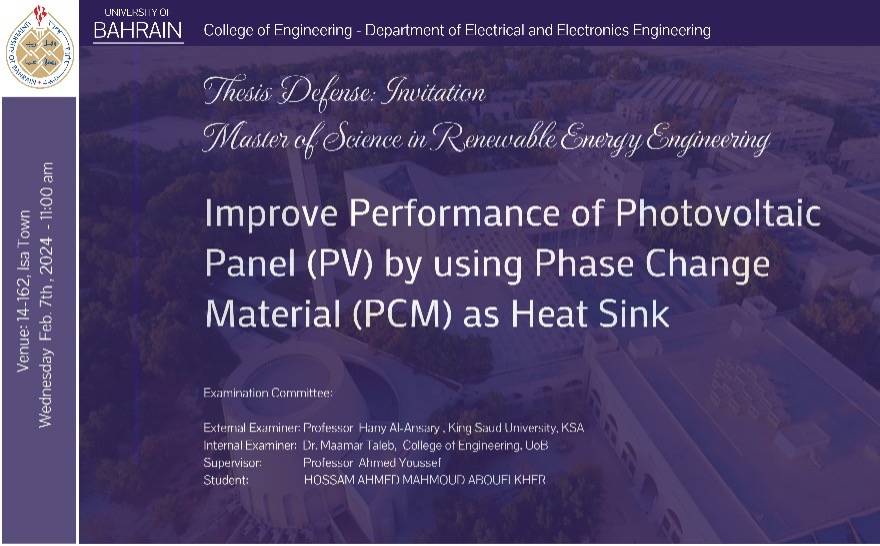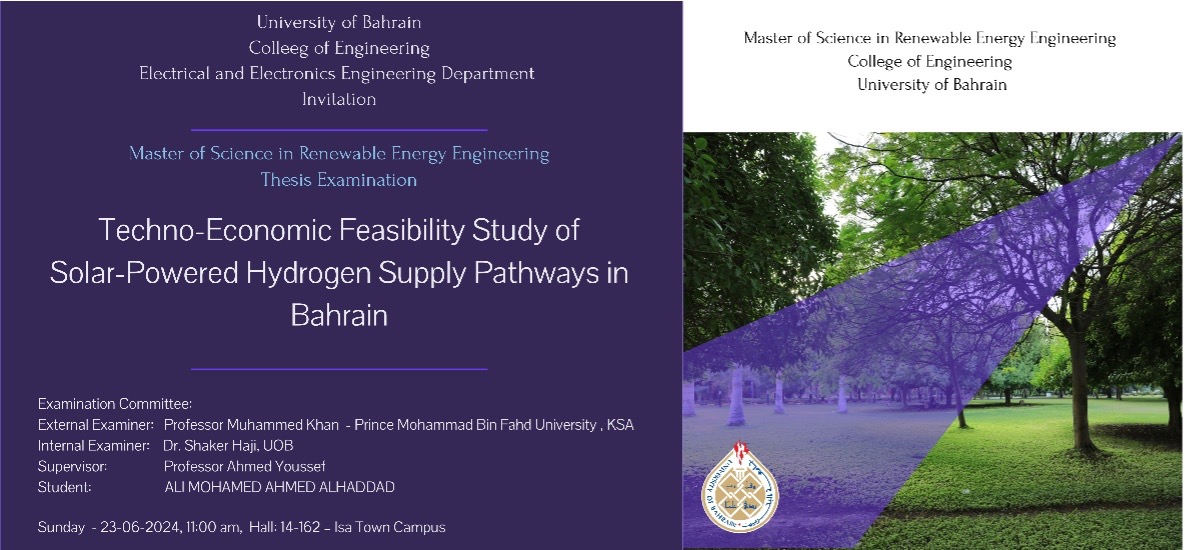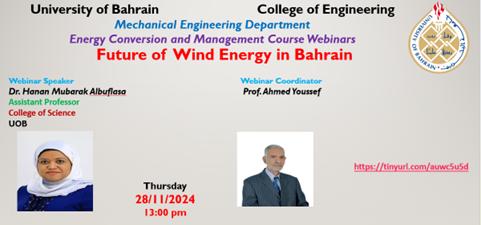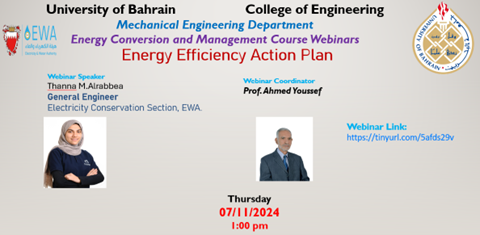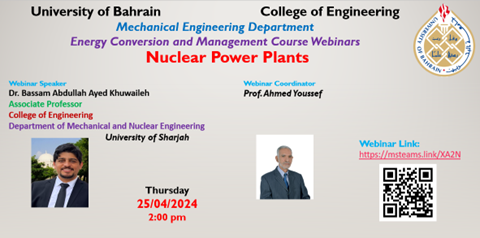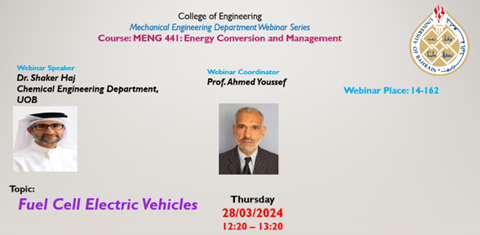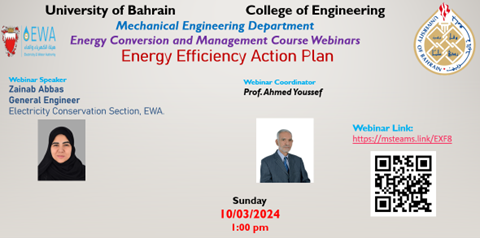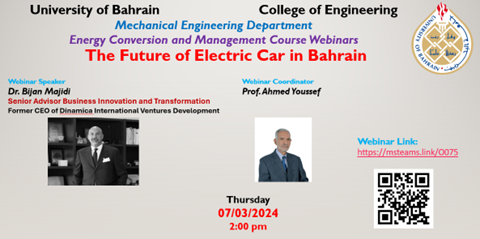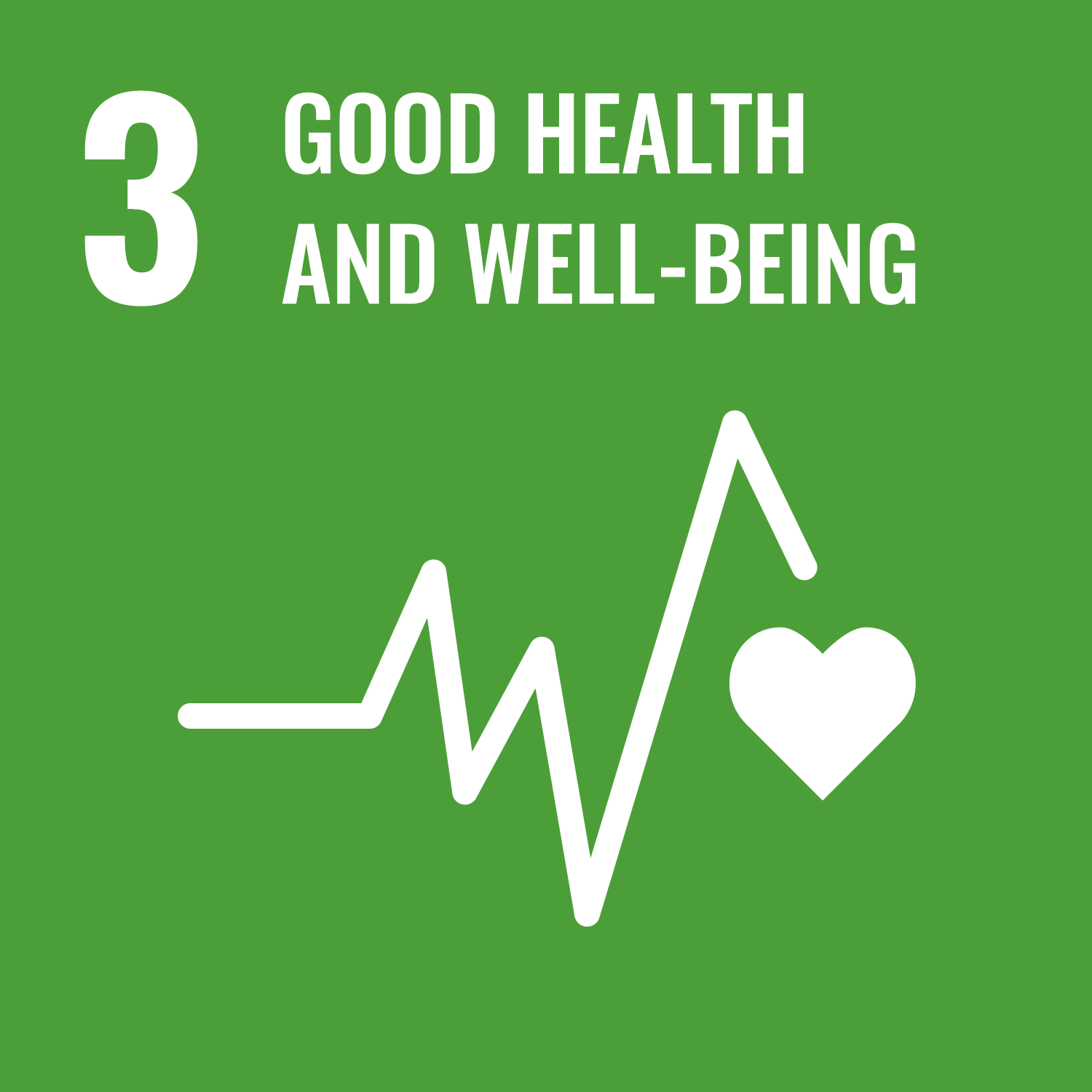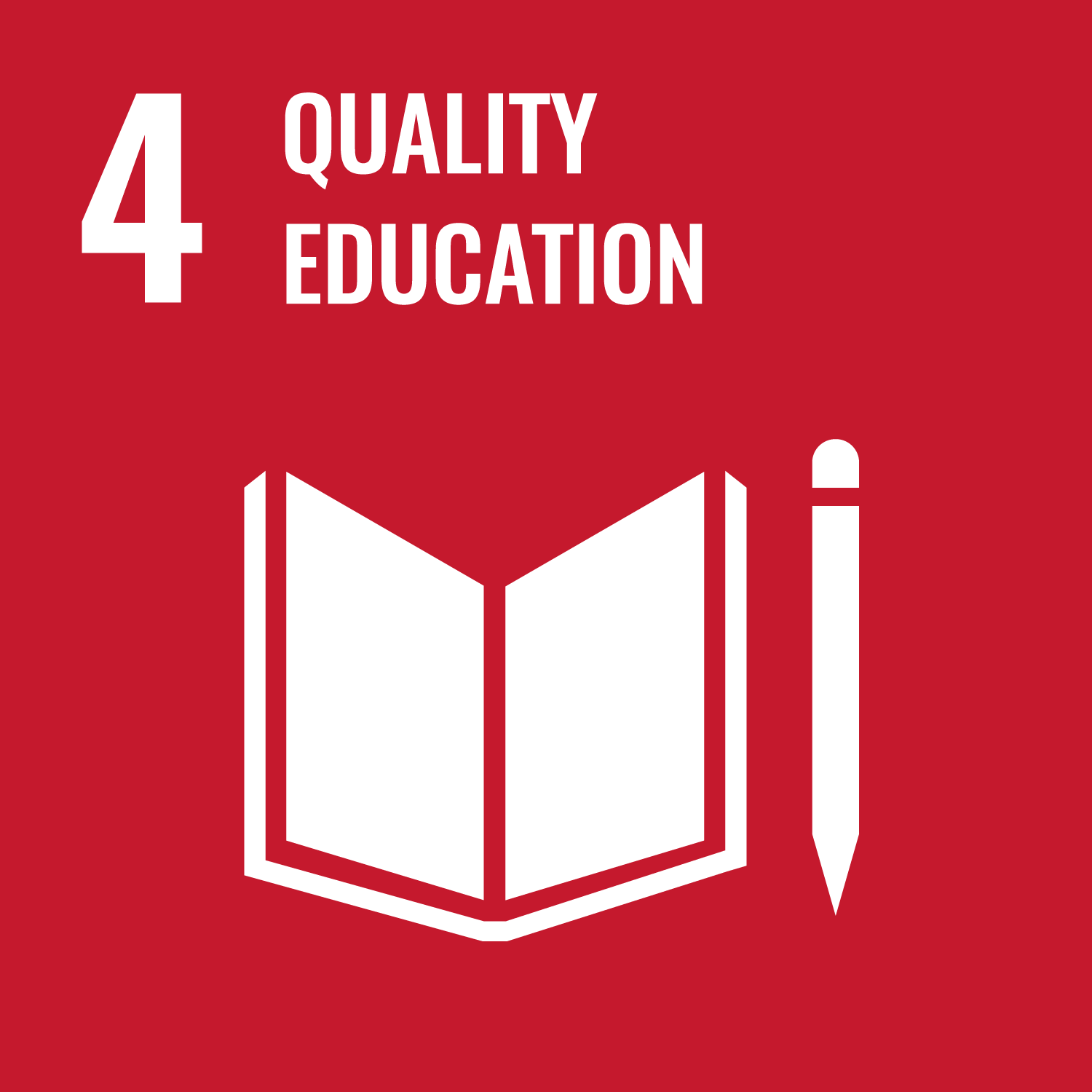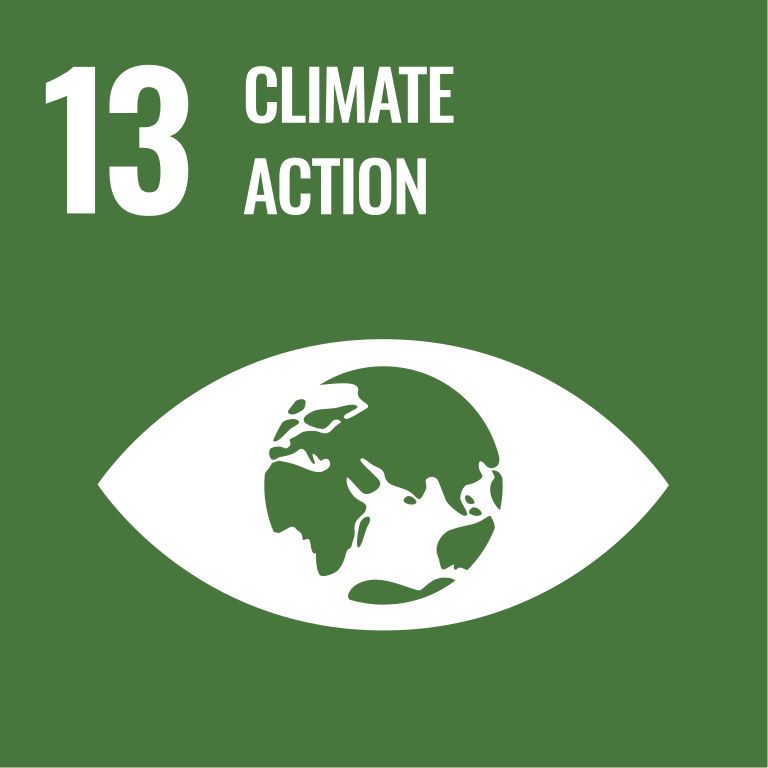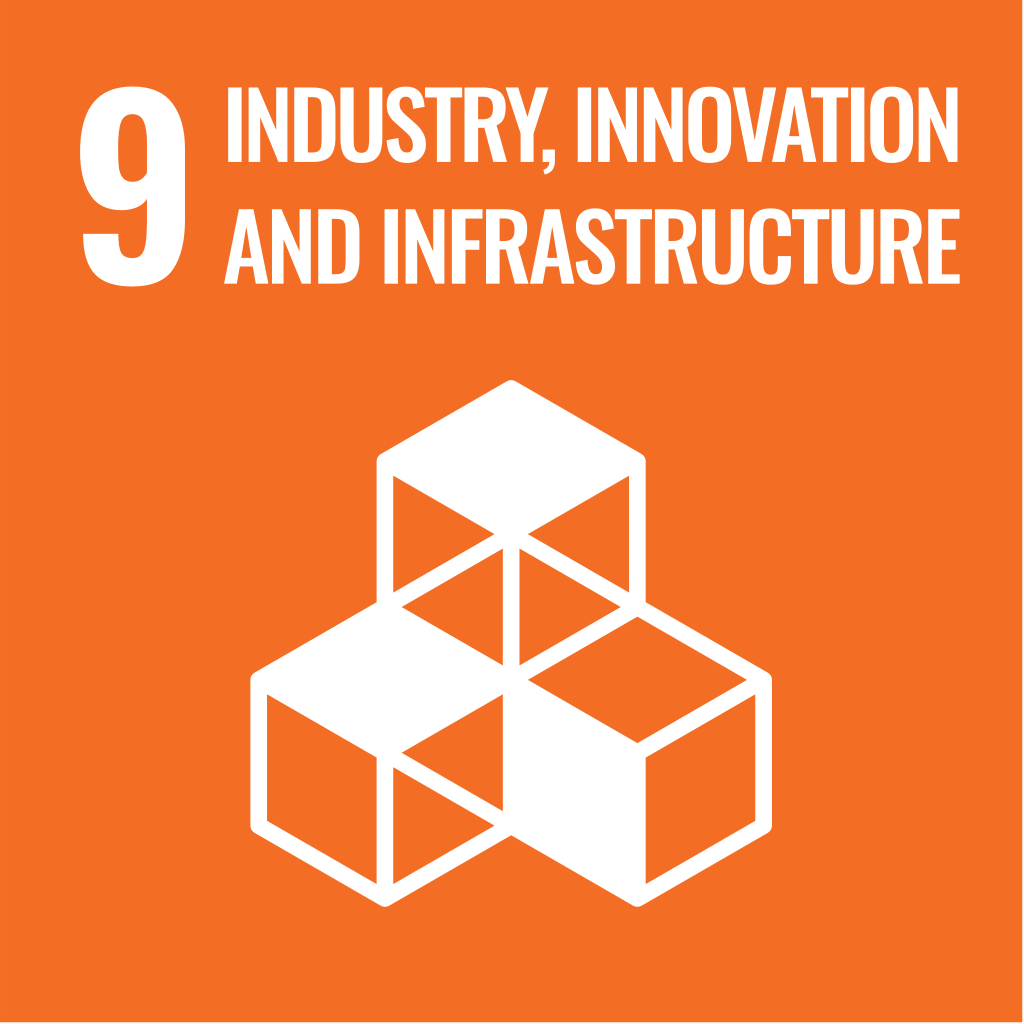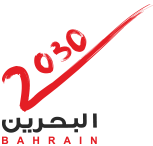Operations and Institutional Arrangement
SDG 13: Focus Areas
13.3.1 Local education programs on climate
Does your university as a body provide local education programmes or campaigns on climate change risks, impacts, mitigation, adaptation, impact reduction and early warning?
Yes, the University of Bahrain (UoB) provides comprehensive local education programs and campaigns addressing climate change risks, impacts, mitigation, adaptation, impact reduction, and early warning. These initiatives are embedded in both academic curricula and extracurricular activities, directly supporting SDG 13.3.1.
Key Evidence:
- Postgraduate Programs:
UoB offers two specialized Master’s degrees in Renewable Energy Engineering and Sustainable Energy Transition Systems, designed to build expertise in climate-responsive technologies and sustainable development.
The College of Science provides M.Sc. and Ph.D. programs in Environment and Sustainable Development, and a Master’s in Environmental Chemistry, focusing on climate change mitigation, adaptation, and sustainability.
- Undergraduate Courses:
Climate action and sustainability topics are integrated across undergraduate programs in multiple colleges, including Bahrain Teachers College, College of Business Administration, and College of Engineering.
Courses cover environmental sciences, sustainable development, renewable energy, climate literacy, and eco-friendly practices.
- Seminars, Campaigns, and Outreach:
UoB regularly organizes seminars, technical workshops, and field visits on climate change, renewable energy, and sustainability, led by experts and researchers.
Events such as Solar Appreciation Day, national decarbonization seminars, and technical lectures promote climate awareness and practical skills among students and the community.
- Collaborations and Impact:
The university collaborates with international organizations (e.g., UNESCO, UNDP, UNEP) and industry partners to enhance climate education and research.
These programs and campaigns equip graduates and participants with the knowledge and skills to contribute to Bahrain’s transition to clean energy and climate resilience.
Conclusion:
The University of Bahrain actively implements local education programs and campaigns on climate change, fulfilling the requirements of SDG 13.3.1. These efforts demonstrate institutional commitment to climate action, capacity building, and sustainable development.
The section below outlines the initiatives and their corresponding details.
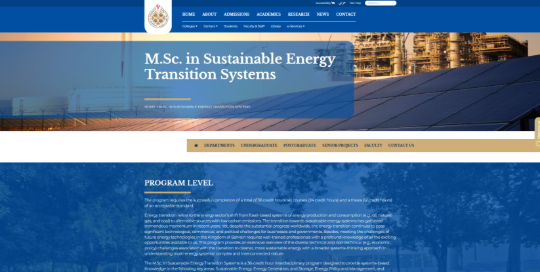
Postgraduate Programs in Renewable and Sustainable Energy
Overview:
The College of Engineering at the University of Bahrain (UoB) has established two postgraduate programs — the Master of Science in Renewable Energy Engineering and the Master of Science in Sustainable Energy Transition Systems — to strengthen education and research capacity in climate-related fields. These programs are designed to equip graduates with the skills and knowledge required to address the challenges of renewable energy integration, energy efficiency, and sustainable development.
Program Objectives and Structure:
- Both programs aim to build human resource capacity in renewable and sustainable energy sectors, preparing professionals to contribute to national and regional climate action.
- The curriculum includes three courses per semester in the first year, focusing on renewable technologies, energy systems, and climate-responsive design, followed by a research thesis in the second year.
- Students undertake research projects addressing real-world sustainability challenges, contributing to Bahrain’s transition toward clean energy and emission reduction.
Impact and SDG Alignment:
These postgraduate initiatives directly support SDG 13 – Climate Action, specifically:
- Target 13.3: Improve education, awareness, and human and institutional capacity on climate change mitigation, adaptation, and impact reduction.
- Indicator 13.3.1: Implementation of local education programs on climate, represented through the establishment of graduate-level degrees dedicated to renewable and sustainable energy disciplines.
Relevant SDG 13 Targets and Indicators:
- Provision of higher education programs and training on climate-related topics.
- UOB Contribution: Offers advanced degrees and UNDP-certified courses in climate science, renewable energy, and sustainable development to build capacity and expertise for climate action.
- Launch of postgraduate programs (M.Sc. in Renewable Energy Engineering and M.Sc. in Sustainable Energy Transition Systems) focused on developing national expertise in renewable energy, sustainability, and climate action.
- Examples of graduate students’ thesis topics in the College of Engineering in the past year are shown below:
Sustainable Environment and Sustainable Development Educational Programs in College of Science
Overview:
The College of Science at the University of Bahrain (UoB) offers advanced graduate programs that directly contribute to climate education and research. These include the M.Sc. and Ph.D. in Environment and Sustainable Development, and the recently launched M.Sc. in Environmental Chemistry. The programs aim to develop scientific expertise and practical competencies in understanding, mitigating, and managing the environmental impacts of climate change.
Program Focus:
- The Master’s Program in Environment and Sustainable Development (ESD) at the University of Bahrain directly supports SDG 13.3.1 by strengthening education, awareness, and professional capacity in climate change mitigation, adaptation, and sustainability practices. Established in 2002 with UNESCO’s support and redeveloped in 2017 in collaboration with the Prince’s Foundation (UK), the program offers two specialized streams: Environmental Science and Development and Sustainable Urbanism.
- The program’s objectives are to:
- Prepare graduates for successful careers in environment and sustainable development fields.
- Qualify students for advanced graduate studies in related disciplines.
- Empower graduates to serve the community in protecting the environment and advancing sustainability principles.
- Through an interdisciplinary and practice-oriented curriculum, the program cultivates the following learning outcomes:
- Application of advanced environmental and sustainability knowledge.
- Critical analysis and comparison of complex environmental challenges and their solutions.
- Integration of emerging sustainability issues through interdisciplinary methods.
- Mastery of professional research, communication, and ethical academic standards.
- Development of intellectual independence for lifelong learning and continued professional growth.
Courses are delivered by faculty from across the University of Bahrain and experts from the Prince’s Foundation, supported by collaborations with governmental and non-governmental organizations. The program combines lectures, case studies, field visits, and research projects focused on real-world issues such as energy, water, waste, and pollution. This approach ensures that graduates are equipped with the knowledge, skills, and leadership capacity to advance Bahrain’s and the region’s transition toward a sustainable and climate-resilient future.
- Read More about M.Sc in Environment and Sustainable Development .
- The Doctor of Philosophy (Ph.D.) in Environment and Sustainable Development (ESD) at the University of Bahrain plays a pivotal role in advancing SDG 13.3.1 by fostering high-level expertise, research, and leadership in climate action and sustainability. The program emphasizes the development of sustainable systems that promote environmentally responsible, energy-efficient, and economically viable practices that safeguard human and ecological well-being. Anchored in an interdisciplinary framework, the Ph.D. program engages nearly all colleges within the University of Bahrain and collaborates with international partners such as the United Nations University (UNU), the United Nations Development Programme (UNDP), and the United Nations Environment Program (UNEP). This broad collaboration ensures that graduates are equipped to address the most pressing environmental and developmental challenges locally, regionally, and globally.
- The program’s core objectives are to:
- Prepare qualified decision-makers, academics, and environmental managers in sustainable development fields.
- Advance national and international research and knowledge in sustainability.
- Contribute effectively to the social, economic, and environmental well-being of communities.
Through a rigorous, research-driven curriculum aligned with the UN Sustainable Development Goals 2030, the program enables students to:
- Apply advanced, up-to-date knowledge in environmental and sustainability sciences.
- Critically analyze and propose solutions to complex global and regional sustainability issues.
- Conduct integrated assessments addressing national, regional, and international environmental challenges.
- Examine emerging developments linked to the 2030 Agenda for Sustainable Development.
- Employ advanced qualitative and quantitative research methodologies.
- Design and execute original, high-impact research in environmental and sustainability fields.
- Communicate research findings effectively through professional academic and policy channels.
By combining interdisciplinary instruction, global partnerships, and applied research, the Ph.D. in ESD prepares graduates to become influential leaders driving sustainable transformation and climate resilience in Bahrain and beyond.
- Read more about Ph.D in Environment and Sustainable Development
The Master of Science in Environmental Chemistry at the University of Bahrain is designed to advance SDG 13.3.1 by preparing leaders capable of addressing environmental challenges through scientific innovation, sustainable practices, and research-based solutions. As global awareness of environmental and chemical safety increases, this program responds to the growing need for professionals who can balance industrial progress with ecological responsibility.
Developed in collaboration with industry experts, the program provides a two-year interdisciplinary curriculum that equips students with advanced theoretical knowledge and hands-on laboratory experience in environmental chemistry. Students engage in applied research across five key areas: Water Purification and Wastewater Treatment, Air Pollution and Its Control, Treatment of Organic Waste, Environmental Corrosion Monitoring Systems, and Environmentally Friendly and Green Products. The program emphasizes real-world problem solving and industry relevance, ensuring graduates are well-prepared to meet the sustainability and innovation needs of the Kingdom of Bahrain and beyond.
The program’s objectives are to:
- Equip graduates with the scientific and analytical skills to address environmental problems.
- Provide advanced laboratory competencies aligned with industrial and organizational demands.
- Foster independent and applied research capabilities.
- Strengthen the ability to translate innovative research ideas into practical market solutions.
Upon completion, graduates will be able to:
- Critically analyze the chemical principles underlying environmental systems.
- Evaluate and apply emerging developments in environmental chemistry.
- Communicate complex scientific concepts effectively to peers and stakeholders.
- Reflect on their skills and progress to support lifelong professional development.
- Develop creative solutions to new environmental challenges through methodological adaptation.
- Systematically assess and synthesize scientific literature to inform sustainable practices.
Through its integration of advanced research, industrial collaboration, and sustainability-driven education, the Master’s in Environmental Chemistry empowers graduates to contribute meaningfully to national and global efforts in environmental protection, sustainable industry, and climate action.
- Read more about M.Sc. in Environmental Chemistry
Undergraduate Academic Program Courses Supporting SDG 13.3.1
In addition to its postgraduate offerings, the University of Bahrain integrates sustainability and climate action topics across various undergraduate programs. These courses, delivered through different colleges and disciplines, contribute directly to SDG 13.3.1 by enhancing students’ understanding of climate change, environmental sustainability, and related global challenges. The following table presents the list of these undergraduate courses.
| No. | College | SDG Related Courses | Topics / SDG Connection |
|---|---|---|---|
| A. College: Bahrain Teachers College | |||
| 1 | Bahrain Teachers College | Teaching Environmental & Earth Sciences 2 (TC2SCT413) | Introduces environmental and Earth sciences and their link to sustainable development. Covers air quality, climate change, renewable energy, biodiversity, waste management, and ecosystems. Students learn the role of ecosystems in regulating Earth’s climate and apply this understanding in teaching climate action. Aligned SDGs: 4, 6, 7, 11, 12, 15, 17 |
| 2 | Bahrain Teachers College | Teaching Environmental & Earth Sciences 1 (TC1SC348) | Focuses on the relationship between environmental sciences and sustainable development, including biodiversity, air quality, renewable energy, and climate change. Encourages climate literacy and lesson design promoting environmental stewardship. Aligned SDGs: 4, 6, 7, 11, 12, 14, 15, 17 |
| 3 | Bahrain Teachers College | Health, Safety, and Nutrition for Children (TCHL418) | Examines climate change impacts on children’s health and wellbeing, promoting eco-friendly environments and health education. Aligned SDGs: 2, 3, 4, 5, 6, 10, 12, 16, 17 |
| 4 | Bahrain Teachers College | General Science (TCSC118) | Covers environmental conservation, ecosystems, energy, pollution, and sustainable practices. Highlights the role of human activities in climate change. Aligned SDGs: 12, 14, 15 |
| 5 | Bahrain Teachers College | Fundamentals of Biology (TC2SC213) | Explores ecosystem structure and function, emphasizing their role in regulating Earth’s climate and supporting climate action. Aligned SDGs: 13, 14, 15 |
| 6 | Bahrain Teachers College | Teaching Environmental Literacy and 21st Century Learning Skills in Science (TCSC228) | Develops environmental literacy and integrates SDG-based themes into education. Promotes climate change mitigation and adaptation learning. Aligned SDGs: 6, 7, 14, 15 |
| B. College: College of Business Administration | |||
| 1 | College of Business Administration | Sustainability Accounting & Reporting (ACC485) | Focuses on sustainability reporting, ESG disclosure, and accountability in business. Aligned SDGs: 12 |
| 2 | College of Business Administration | Environmental Economics & Sustainable Development (ECON351) | Links environmental sustainability with economic policy for sustainable growth. Aligned SDGs: 15 |
| 3 | College of Business Administration | Sustainable Finance (FIN330) | Addresses green investment, ESG financing, and climate-related financial risk. Aligned SDGs: 7 |
| C. College: College of Engineering | |||
| 1 | College of Engineering | Graduation Project I (ARCH 511) | Students apply sustainable design and renewable energy systems to develop climate-responsive architecture. Aligned SDGs: 3, 4, 9, 11, 12 |
| 2 | College of Engineering | Graduation Project II – Design Stage (ARCG 520) | Focuses on environmental integration and energy-efficient architectural solutions promoting climate resilience. Aligned SDGs: 3, 4, 9, 11, 12 |
| 3 | College of Engineering | Architectural Design V (ARCG 410) | Encourages housing design integrating climate responsiveness, sustainable materials, and energy efficiency. Aligned SDGs: 3, 4, 9, 11, 12 |
| 4 | College of Engineering | Vernacular Heritage (ARCG 318) | Explores climate-responsive vernacular design and its role in sustainable architecture. Aligned SDGs: 4, 9, 11, 12 |
| 5 | College of Engineering | Highway Engineering | Emphasizes sustainable transport infrastructure and environmental impact reduction. Aligned SDGs: 9, 11, 13 |
| 6 | College of Engineering | Traffic Flow and Capacity Analysis | Focuses on sustainable, data-driven traffic management to reduce emissions. Aligned SDGs: 9, 11, 13 |
| 7 | College of Engineering | Plant Design Project (CHENG423) | Integrates environmental impact assessment and sustainable engineering design. Aligned SDGs: 3, 4, 9, 12, 13 |
| 8 | College of Engineering | Graduation Project (INTD 411 & 420) | Encourages sustainable material use and energy-efficient design in interior architecture. Aligned SDGs: 4, 7, 11, 12, 13 |
| 9 | College of Engineering | Building Construction I (INTA 212) | Explores sustainable construction techniques and eco-friendly materials for climate-responsive building design. Aligned SDGs: 4, 11, 12, 13 |
Climate Change and Renewable Energy Seminars
Overview:
The University of Bahrain organized multiple local seminars in 2024 on sustainable energy, electric and fuel cell vehicles, wind and nuclear power, and energy efficiency. These programs, coordinated with industry and government experts, addressed climate change risks, mitigation, adaptation, and sustainability practices, raising awareness among students and faculty and promoting actionable knowledge for energy transition and climate impact reduction in Bahrain.
1. The Future of Electric Car in Bahrain (March, 2024)
This seminar explored the prospects and challenges of electric vehicles in Bahrain. Delivered as part of the Energy Conversion and Management Course Webinar Series, the session featured Dr. Bijan Majidi as the speaker and was coordinated by Prof. Ahmed Youssef. The seminar provided insights into technological advancements, market trends, and the potential impact of electric cars on regional sustainability and energy consumption.
This workshop exemplifies cross-sector collaboration, bringing together university experts and industry leaders to advance sustainable mobility solutions in Bahrain.
2. Nuclear Power Plants (April, 2024)
This workshop focused on the fundamentals and future of nuclear power plants, emphasizing their role in sustainable energy production. Dr. Bassam Abdullah Ayed Khuwalleh, Associate Professor at the University of Sharjah, led the session with coordination by Prof. Ahmed Youssef. The seminar addressed nuclear technology, safety considerations, and its relevance to Bahrain’s energy strategy.
The event demonstrates international academic partnership, with expertise shared between the University of Bahrain and the University of Sharjah to strengthen regional energy knowledge and policy.
3. Energy Efficiency Action Plan (March, 2024)
The seminar on energy efficiency was designed to inform participants about strategic approaches to reducing energy consumption and enhancing sustainability. Zainab Abbas, General Engineer from the Electricity Conservation Section at EWA, was the main speaker, coordinated by Prof. Ahmed Youssef. The session covered practical measures and policy frameworks for implementing energy efficiency across various sectors in Bahrain.
This initiative highlights collaboration between academia and government agencies, fostering joint action for improved energy management and sustainability.
4. Future of Wind Energy in Bahrain (November, 2024)
This workshop examined the potential for wind energy development in Bahrain. Dr. Hanan Mubarak Albufiasa, Assistant Professor at the College of Science, presented the session, coordinated by Prof. Ahmed Youssef. The seminar discussed technological innovations, feasibility studies, and the integration of wind energy into Bahrain’s renewable energy portfolio.
The workshop showcases partnerships between university researchers and national stakeholders to promote renewable energy adoption and innovation.
6. Fuel Cell Electric Vehicles (March, 2024)
This seminar, part of the MENG 441: Energy Conversion and Management course, focused on the technology and sustainability of fuel cell electric vehicles. Dr. Shaker Haj from the Chemical Engineering Department at UOB was the speaker, with Prof. Ahmed Youssef as coordinator. The session highlighted the environmental benefits and engineering challenges of adopting fuel cell vehicles in Bahrain.
The seminar demonstrates partnership between academic departments and external experts to accelerate the transition to clean transportation technologies.
7. Energy Efficiency Action Plan (November, 2024)
Another session on energy efficiency featured Thanna M. Alrabbea, General Engineer at EWA, as the speaker. Coordinated by Prof. Ahmed Youssef, this seminar reinforced the importance of conservation strategies and provided updated approaches for energy management in Bahrain’s public and private sectors.
This workshop underscores the value of ongoing collaboration between the University of Bahrain and government entities to drive sustainable energy practices.
Impact: These seminars strengthen environmental education and inspire participants to adopt sustainable practices and innovative solutions, contributing to SDG 13.3 by fostering climate literacy and technical competence in green technologies.
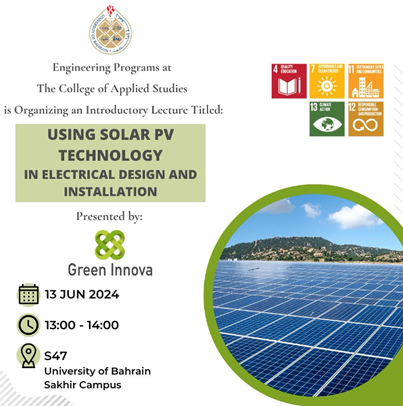
Using Solar PV Technology in Electrical Design and Installation
Overview: The College of Applied Studies, in collaboration with Green Innova, hosted a lecture on integrating solar PV systems into electrical design and installation (June 13, 2024).
Impact: The session provided practical knowledge on solar technology applications, promoting renewable energy adoption and developing students’ skills in sustainable engineering aligned with Bahrain’s national energy transition goals.
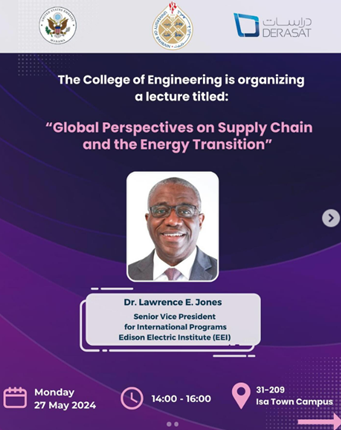
Global Perspective on Supply Chain and the Energy Transition
Overview: The College of Engineering partnered with the U.S. Embassy and Derasat Center to present insights into global energy transitions and sustainable supply chains (May 27, 2024).
Impact: The seminar encouraged understanding of global decarbonization efforts and the role of engineering in sustainable development, enhancing students’ capacity to contribute to clean energy solutions in line with SDG 13.
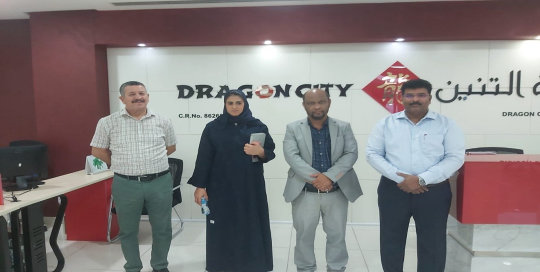
Solar Car Parking Facility Visit – Dragon City
Overview: Electrical Engineering postgraduate students visited the solar car parking facility at Dragon City as part of their renewable energy thesis projects.
Impact: The field visit connected theory with practice, offering hands-on exposure to large-scale solar systems and fostering innovation in local renewable energy applications.
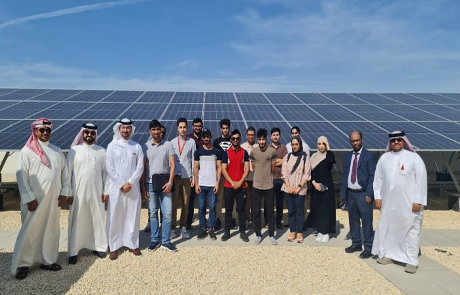
School Visit – Rooftop Solar PV Systems
Overview: Students from the Electrical Engineering Department visited a government school in Bahrain to study rooftop solar PV installations as part of the Solar and Wind Energy Systems course.
Impact: The visit enhanced students’ understanding of community-level solar energy adoption, supporting practical learning in sustainability and strengthening educational outreach in environmental technology.
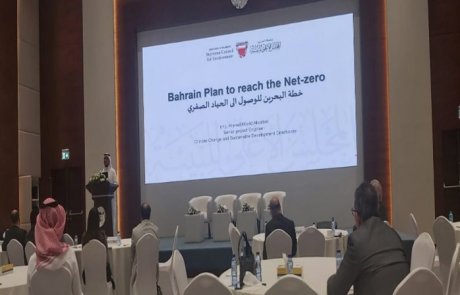
Participation in Bahrain Decarbonization Seminar 2024
Overview: Faculty members attended the national Decarbonization Seminar, featuring Eng. Ahmed Khalid Alqattan’s presentation of the “Bahrain Plan to Reach Net-Zero,” organized by the Supreme Council for Environment.
Impact: The participation reinforced UOB’s alignment with national climate strategies and encouraged academic collaboration in advancing decarbonization and clean energy research.
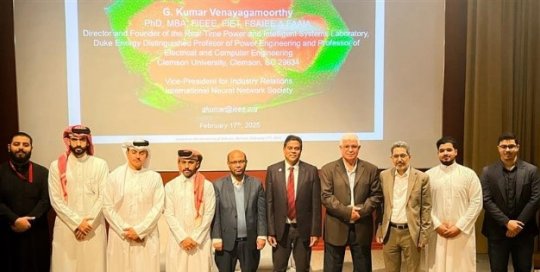
Technical Seminar: Green AI for Next-Generation Networks
Overview: The Department of Electrical Engineering hosted a seminar on “Resource Optimization for Green AI Federated Learning,” presented by Prof. Naofal Al-Shahir from the University of Texas.
Impact: The seminar linked digital innovation with sustainability, exploring how AI technologies can reduce energy consumption and optimize resources in future wireless systems, advancing SDG 13 through technological transformation.
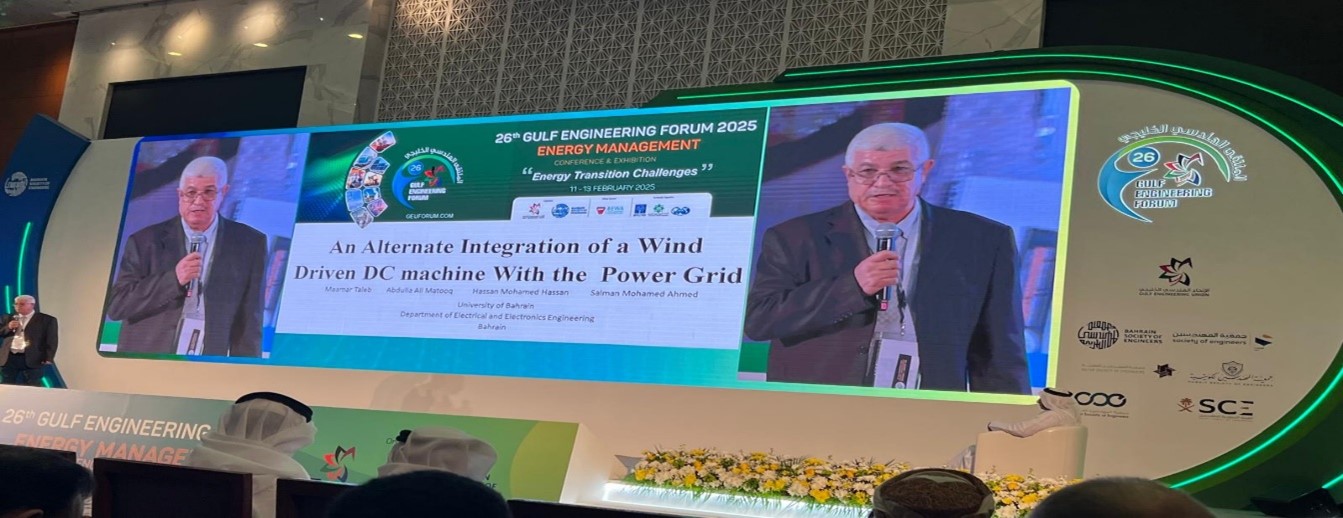
Research Presentation – 25th Gulf Engineering Forum
Overview: Faculty member Dr. Maamar presented a research paper at the Gulf Engineering Forum, showcasing UOB’s contributions to regional engineering innovation and sustainable technologies.
Impact: The presentation highlighted the university’s active research engagement in sustainability, reinforcing UOB’s regional leadership in engineering solutions addressing climate challenges.
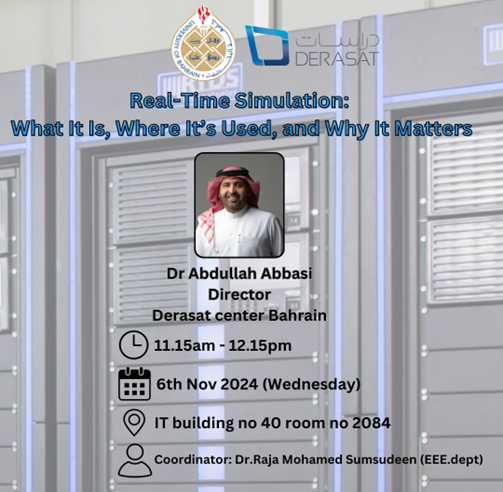
Technical Seminar: Real-Time Simulations in Energy Systems
Overview: A seminar by Derasat’s Sustainable Energy Section Director, Dr. Abdullah Abbasi, explored real-time simulations and their significance in advancing energy research.
Impact: This event expanded student and faculty knowledge on energy modeling and sustainability analytics, supporting the development of advanced research capacities in sustainable energy solutions.
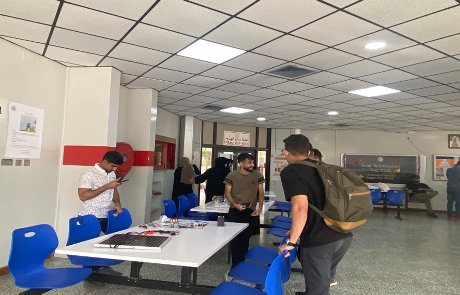
Solar Appreciation Day 2023
Overview: The Electrical Engineering Department hosted Solar Appreciation Day, showcasing innovative student solar projects and promoting renewable energy awareness on campus.
Impact: The event celebrated student-led innovation and fostered a campus-wide culture of sustainability, motivating broader participation in renewable energy research and applications.
